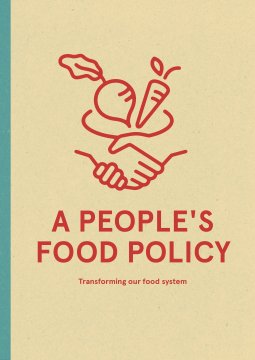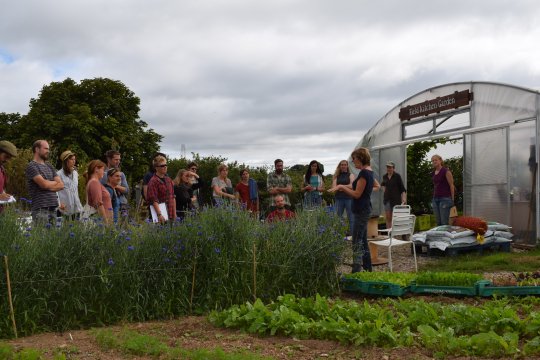
As Brexit negotiations begin, England has been urged to develop progressive food policy in advance of leaving the EU.
Common Good Food is proud to support ‘A People’s Food Policy’ - a comprehensive proposal for a more just and sustainable food system in England created by a coalition of grassroots food and farming organisations across the UK.
Today sees the launch of this ground-breaking manifesto, outlining a people’s vision of food and farming in England that is supported by over 80 food and farming organisations. The report draws on 18 months of extensive, nation-wide consultations with grassroots organisations, NGOs, trade unions, community projects, small businesses and individuals. It has resulted in a set of policy proposals and a vision for change that is rooted in the lived experiences and needs of people most affected by the failures in the current food system.
It’s widely acknowledged that agriculture is one of the sectors that will be faced with the most uncertainty as a result of the UK leaving the EU. Rising food prices is an issue that has already been repeatedly reported on in the context of Brexit, while migration restrictions are set to have an enormous impact on the availability of workers in the agricultural sector.
In the face of this uncertainty, the report argues that policy, legislative framework and a food act is needed that, “integrates the compartmentalised policy realms of food production, health, labour rights, land use and planning, trade, the environment, democratic participation and community wellbeing.”
Scotland is already in process of adopting national food policies and is currently developing a ‘Good Food Nation Bill’, while England has yet to make any progress. If the Westminster government takes this policy on board, this would have significant positive benefits for the other devolved nations, due to the influence on Scotland's block grant by decisions made on reserved matters, such as farm subsidies and taxation.

Heidi Chow, food campaigner for Global Justice Now which is part of the coalition that developed A People’s Food Policy said:
“From the increasing corporate control of agriculture in the UK, to the price of basic food stuffs outstripping the rises in real wages, through to small farmers being aggressively squeezed out of the market, with over 33 000 small to medium farms closing down in the past decade – the UK is witnessing a series of crises in how we produce, distribute and sell food. The government’s approach to addressing these problems is at best piece-meal and at worst non-existent.
The new Environment Secretary. Michael Gove commented last week that the UK can have both cheaper and higher quality food after Brexit. But the experience of many UK farmers and growers suggests that cheaper food prices must be paid for through lowering environmental and social standards across the farming sector. Instead we need to see greater regulation of the food retail sector to ensure farmers everywhere are paid a fair price for their produce.’’
Dee Butterly, the coordinator of A People’s Food Policy, young tenant farmer and member of the Landworkers’ Alliance said:
“The lack of a coherent, joined-up food policy framework in England is becoming increasingly problematic. In this country we have shameful levels of food insecurity, with food bank usage rising year on year, and an estimated over eight million people now in a state of such financial precarity they can’t afford to eat. Just last week, Unicef released a report ‘Building the Future’, with evidence that the UK has some of the highest levels of child hunger and deprivation among the world’s richest nations, with one in five children under 15 years old currently food insecure.
The way our food system functions and is governed needs to radically change. We need to develop a national food policy in the coming years that transforms our food systems and that puts equality, resilience and justice at the forefront. As Brexit negotiations begin, we urge politicians to seriously consider this blueprint for a progressive national food policy which supports a food system where everybody, regardless of income, status or background, has secure access to enough good food at all times, without compromising on the wellbeing of people, the health of the environment, and the ability of future generations to provide for themselves.”
Many countries in Europe and around the world have begun to adopt progressive frameworks like food sovereignty, agroecology and the right to food into regional and national legislation in an effort to create a more stable and just food system.
A People’s Food Policy is an extensive report, extending to 100 pages across 9 thematic chapters covering governance, food production, health, land, labour, environment, knowledge and skills, trade and finance - each with an in depth analysis and policy proposals for transforming the food system in England.
Download a copy at www.peoplesfoodpolicy.org



